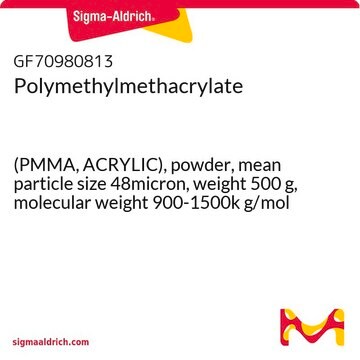03558
Poly(methyl methacrylate)
analytical standard, for GPC, 2,480,000
Synonym(s):
PMMA, Poly(methacrylic acid methyl ester)
Sign Into View Organizational & Contract Pricing
All Photos(1)
About This Item
Linear Formula:
[CH2C(CH3)(CO2CH3)]n
CAS Number:
MDL number:
UNSPSC Code:
41116107
PubChem Substance ID:
NACRES:
NA.24
Recommended Products
grade
analytical standard
for GPC
Quality Level
autoignition temp.
580 °F
shelf life
limited shelf life, expiry date on the label
mol wt
Mn ~2140000
Mp ~2740000
Mw ~2480000
solubility
H2O: insoluble
density
1.200 g/cm3
Mw/Mn
~1.16
storage temp.
2-8°C
InChI
1S/C5H9O2/c1-4(2)5(6)7-3/h1-3H3
InChI key
PMAMJWJDBDSDHV-UHFFFAOYSA-N
Looking for similar products? Visit Product Comparison Guide
General description
Poly(methyl methacrylate) is a material, which can be used in the fabrication of micro-fluid chips. It can also find applications in nano-transfer printing, since it can act like a macroscopic mediator in order to handle nanoscale building blocks.
Storage Class Code
11 - Combustible Solids
WGK
nwg
Personal Protective Equipment
dust mask type N95 (US), Eyeshields, Gloves
Choose from one of the most recent versions:
Already Own This Product?
Find documentation for the products that you have recently purchased in the Document Library.
Customers Also Viewed
Creation of nanostructures with poly (methyl methacrylate)-mediated nanotransfer printing
Jiao L, et al.
Journal of the American Chemical Society, 130, 12612-12613 (2008)
Development and spectral characterization of poly (methyl methacrylate)/hydroxyapatite composite for biomedical applications
Chen Y, et al.
Development and spectral characterization of poly (methyl methacrylate)/hydroxyapatite composite for biomedical applications, 18(1), 41-45 (2004)
Angelo Accardo et al.
Nanoscale, 5(6), 2295-2299 (2013-02-22)
Drops of exosome dispersions from healthy epithelial colon cell line and colorectal cancer cells were dried on a superhydrophobic PMMA substrate. The residues were studied by small- and wide-angle X-ray scattering using both a synchrotron radiation micrometric beam and a
Bo Chen et al.
Journal of controlled release : official journal of the Controlled Release Society, 140(3), 203-209 (2009-05-26)
Water-soluble polymers for the delivery of chemotherapeutic drugs passively target solid tumors as a consequence of reduced renal clearance and the enhanced permeation and retention (EPR) effect. Elimination of the polymers in the kidney occurs due to filtration through biological
A K Pathak et al.
The Journal of clinical pediatric dentistry, 37(3), 335-339 (2013-07-17)
Biofilms on removable orthodontic appliances act as reservoir of microorganisms, capable of modifying the environmental condition of oral cavity and are difficult to be removed with routine hygiene measures. The present investigation includes enumeration, identification and numerical analysis of different
Our team of scientists has experience in all areas of research including Life Science, Material Science, Chemical Synthesis, Chromatography, Analytical and many others.
Contact Technical Service


